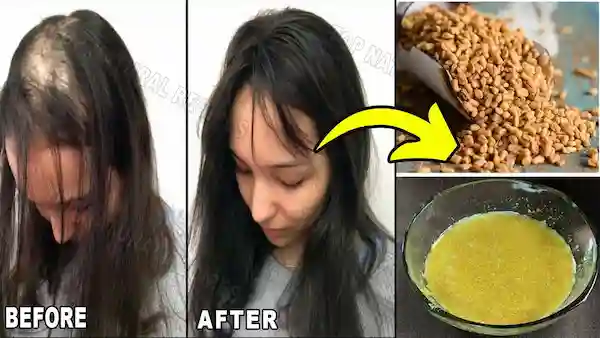Fenugreek is a popular spice used in Indian, Middle Eastern, and Mediterranean cuisines. However, its benefits extend beyond its culinary uses. Fenugreek has been used for centuries as a medicinal herb and as a natural remedy for hair growth and scalp health. In this article, we will explore the benefits of fenugreek for hair, its active constituents, how to use it for hair growth, and other related topics.

Fenugreek
Fenugreek (Trigonella foenum-graecum) is an annual herb native to the Mediterranean region and Asia. The plant produces small, yellowish-white flowers and pods containing 10 to 20 small, yellow-brown, aromatic seeds. Fenugreek seeds have been used in traditional medicine to treat a variety of ailments, including digestive issues, inflammation, and respiratory problems.
How to use fenugreek for hair growth?
Fenugreek can be used in various forms for hair growth, including as a hair mask, oil, or supplement. Here are some ways to use fenugreek for hair growth:
- Fenugreek Hair Mask: Soak fenugreek seeds in water overnight and blend them into a paste the next day. Apply the paste to your scalp and hair and leave it on for 30 minutes to an hour before washing it off with a mild shampoo.
- Fenugreek Oil: Infuse fenugreek seeds in coconut or olive oil for a few days and strain the oil. Apply the oil to your scalp and hair and leave it on for a few hours or overnight before washing it off.
- Fenugreek Supplement: Take fenugreek capsules or tablets as per the recommended dosage.
Does fenugreek make your hair grow?
Fenugreek can promote hair growth by improving blood circulation, strengthening hair follicles, and preventing hair breakage. Fenugreek is rich in protein, iron, and vitamins A, C, and K, all of which are essential for healthy hair growth. It also contains lecithin, an emulsifying substance that hydrates and strengthens hair strands.
How long does it take for fenugreek to grow hair?
The time it takes for fenugreek to grow hair varies from person to person, depending on various factors such as genetics, diet, and overall health. However, regular use of fenugreek can improve hair growth and overall hair health over time. It is recommended to use fenugreek for at least 2-3 months to see visible results.
How much fenugreek should I take for hair?
The recommended dosage of fenugreek for hair growth is 500 to 1000 milligrams per day. However, it is important to consult with a healthcare provider before taking any supplements.
Horsetail extract for hair PubMed
Horsetail extract is another natural remedy that is often used for hair growth. Horsetail is a plant that contains silica, which helps to strengthen hair strands and promote hair growth. According to a study published on PubMed, horsetail extract can improve hair growth and thickness when used topically.
Fenugreek medicinal uses
Fenugreek has several medicinal uses, including:
- Digestive Health: Fenugreek can help relieve constipation, indigestion, and other digestive issues.
- Blood Sugar Control: Fenugreek can help regulate blood sugar levels and may be beneficial for people with diabetes.
- Breast Milk Production: Fenugreek is known to increase breast milk production in lactating women.
- Testosterone Levels: Fenugreek can help increase testosterone levels in men, which may improve libido and muscle mass.
Active constituents of fenugreek contains several active constituents that contribute to its health benefits, including:
- Saponins: These compounds have anti-inflammatory properties and can improve digestion and blood sugar control.
- Flavonoids: Fenugreek contains several flavonoids, which are antioxidants that protect the body against oxidative stress and inflammation.
- Alkaloids: These compounds have analgesic properties and may help relieve pain.
- Steroidal saponins: Fenugreek contains several steroidal saponins, which are compounds that may have cholesterol-lowering effects.
Fenugreek testosterone
Fenugreek is often used as a natural remedy for low testosterone levels in men. Testosterone is a hormone that is important for male reproductive health, muscle mass, and bone density. According to a study published in the International Journal of Exercise Science, supplementation with fenugreek extract can increase testosterone levels and improve body composition in resistance-trained men.
Advantages of fenugreek seeds
Apart from hair growth, fenugreek seeds have several other advantages, such as:
- Improved Digestion: Fenugreek seeds contain fiber, which can help regulate digestion and prevent constipation.
- Lowered Cholesterol: Fenugreek seeds may help lower cholesterol levels and reduce the risk of heart disease.
- Anti-Inflammatory: Fenugreek seeds have anti-inflammatory properties and may help reduce inflammation in the body.
- Improved Breast Milk Production: Fenugreek seeds are known to increase breast milk production in lactating women.
Scalp psoriasis
Scalp psoriasis is a skin condition that affects the scalp, causing redness, itching, and flaking. Fenugreek can help relieve scalp psoriasis symptoms due to its anti-inflammatory properties. Applying fenugreek oil or paste to the scalp can help soothe the skin and reduce inflammation.
Fenugreek for Hair: Summary
Fenugreek is a natural remedy that can promote healthy hair growth and scalp health. It is rich in protein, iron, and vitamins that are essential for healthy hair growth. Fenugreek can be used in various forms, including as a hair mask, oil, or supplement. Regular use of fenugreek can improve hair growth and overall hair health over time. Fenugreek also has several other health benefits, including improved digestion, blood sugar control, and breast milk production. If you are experiencing hair loss or scalp issues, fenugreek can be a natural and effective remedy to consider.



